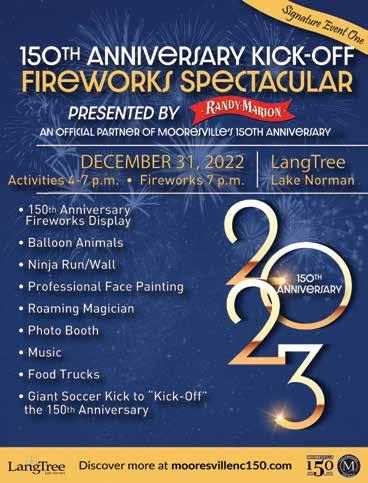
4 minute read
A Moment in Time
Look to the east ...
I found writing this column for December CURRENTS Magazine to be most challenging.
Advertisement
I turned as I often do to my small-town experiences. The source of this month’s small-town story is Alexander City, Alabama. “Alex City,” when I experienced it in the 1980s and 1990s, was the prototypical milltown — a photocopy of the mill towns of North Carolina. It was small, about 15,000 people. One high school where I was principal. One Methodist church where I taught an adult Sunday School class. One Southern Baptist church — the largest. One small Catholic church. A Piggly Wiggly where you could find the best fried chicken in town. One theater with two screens. Miss Debbie’s Dance Academy. And one Jewish family whose children attended my high school.
In Alex City, families went to church on Sunday, and caring for neighbors was a particular point of pride. The kind of town to which college graduates returned.
Our single Jewish family was ingrained into the social and spiritual fabric of Alex City as much as any family could be. They were regular invitees to Christmas parties. They hosted the Dunaways for a Passover seder at Easter, and they celebrated the Passover with our entire Methodist church.
Alex City at Christmas was a community that demonstrated St. Luke’s description of Christmas as a time of “Glory to God in the highest, and on earth peace, goodwill toward men” (Luke 2:14).
My intent with this column is not to be religious but to explore these three significant aspects of Christmas a little differently than we usually do: Mary and Joseph, goodwill toward all and peace on earth, and the men who, according to church tradition, visited the Christ-child — the Maji and the Shepherds.
Mary and Joseph
The couple traveled to their ancestral home of Bethlehem to pay taxes as Roman law demanded. We can argue if Mary and Joseph were married. For the sake of this column, let’s just say they were good friends. I point out one simple fact about the couple — Mary and Joseph were practicing Jews. We will come back to this fact shortly.
The Maji, Wisemen, Kings
St. Matthew writes in 2:1-2, “In the time of King Herod, after Jesus was born in Bethlehem of Judea, magi from the east came to Jerusalem, asking, ‘Where is the child who has been born king of the Jews? For we observed his star in the east and have come to pay him homage.’”
Church tradition in various forms calls these three men Wisemen, Kings and Magi. In fact, one of my favorite Christmas songs is We Three Kings. It begins with this verse: We three kings of Orient are, Bearing gifts, we traverse afar. Field and fountain, moor, and mountain Following yonder star.
by Mickey Dunaway
An obvious fact, it seems, is that we miss the homelands of these three visitors. Britannica.com says, “According to Western church tradition, Balthasar is often represented as a king of Arabia or sometimes Ethiopia, Melchior as a king of Persia (modern day Iran), and Gaspar as a king of India.”
Christmas was an inclusive event almost from the moment of Jesus’ birth.
The Shepherds
Being a country boy, I quickly identify with the shepherds who spent the night in the fields with their flocks. These are commonfolk. I don’t know if they routinely discussed religion with other shepherds as they moved their flocks around to graze on new grass, but I would guess not. They were like many of us — they believed in Jewish traditions — but perhaps just getting by took precedence in their daily lives.
It is clear that without the emphasis on commonfolk, the Christmas story is incomplete. As Abe Lincoln once said, “God must love the common man, He made so many of them.”
At a time when there are more billionaires in the history of the world and making money is a goal unto itself, ordinary people still overwhelmingly populate the earth. I am proud of my upbringing and count myself among that lot.
Final Thoughts
In this time in the history of mankind, where groups are warring with words and accusations or missiles and tanks, if we are to celebrate a Christmas holiday where all people of all origins and beliefs can join peacefully, we need do only three things:
• Emphasize the prophet Isaiah’s vision … “His names will be Wonderful Advisor and Mighty God, Eternal Father, and Prince of Peace.” (Isaiah 9:6) • Heed the all-encompassing description of the event in the Gospel of Luke, “Glory to God in the highest, and on earth peace, good will toward men.” (Luke 2:14). • Recognize some things we may have missed in Christmases past — that three distinct groups representing a multiplicity of religious traditions came together around the birth of Jesus.
Here’s wishing you a Christmas season where we gaze beyond the bright lights and hoped-for gifts and look to the east again for the bright star that drew the shepherds and Wisemen to Bethlehem. Whatever our religious practice, or if we have none, let us pause amidst the hectic days ahead and offer an entreaty to the heavens for peace and goodwill for all mankind.













